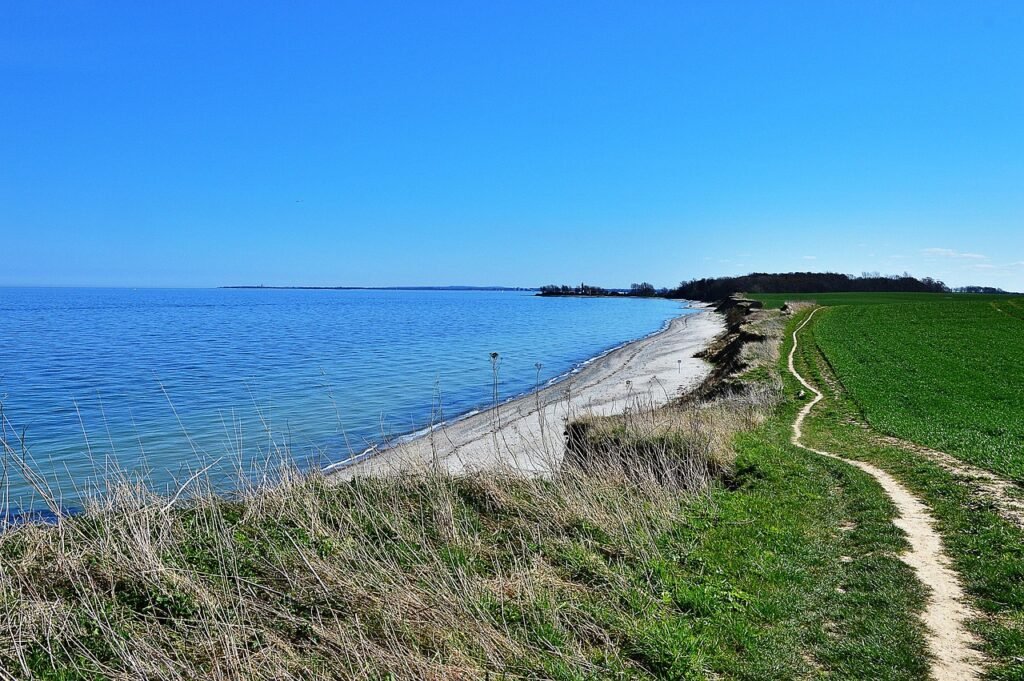Sun, sand, and surf: is there a more universally appealing trio? Beaches offer a sanctuary from the everyday, a place to reconnect with nature, and a playground for all ages. Whether you’re seeking adrenaline-pumping water sports, tranquil relaxation, or unforgettable sunsets, the world’s beaches beckon with open arms. This guide explores the multifaceted allure of beaches, diving into everything from choosing the perfect spot to respecting the coastal environment.
Why We Love Beaches
Beaches hold a special place in our hearts and minds. They represent freedom, relaxation, and the simple joys of life. But beyond the emotional connection, beaches offer tangible benefits for our well-being.
Mental and Physical Health Benefits
Spending time at the beach isn’t just enjoyable; it’s good for you!
- Stress Reduction: The sound of waves has been shown to lower stress levels by inducing a meditative state.
- Vitamin D Boost: Sunlight exposure (in moderation, with sunscreen!) provides essential Vitamin D, crucial for bone health and immune function.
- Physical Activity: Swimming, surfing, beach volleyball, or even just walking along the shore offer excellent opportunities for exercise.
- Improved Mood: The combination of fresh air, sunshine, and natural beauty can significantly elevate your mood and combat feelings of depression.
- Mindfulness and Relaxation: Beaches provide a natural environment conducive to mindfulness, helping you disconnect from daily worries and connect with the present moment.
Economic and Social Impact
Beaches aren’t just havens for tourists; they’re vital to local economies and communities.
- Tourism Revenue: Beaches attract millions of tourists annually, generating significant revenue for local businesses, hotels, restaurants, and tour operators.
- Job Creation: Coastal communities often rely heavily on beach-related tourism for employment opportunities, ranging from lifeguards and hospitality staff to water sports instructors.
- Property Values: Proximity to a beach significantly increases property values, benefiting homeowners and developers.
- Recreational Opportunities: Beaches provide accessible recreational spaces for residents and visitors alike, fostering community engagement and promoting healthy lifestyles.
- Cultural Significance: Many beaches hold historical or cultural significance for local communities, serving as venues for traditional ceremonies, festivals, and gatherings.
Choosing the Right Beach for You
With countless beaches scattered across the globe, selecting the perfect one can feel overwhelming. Consider these factors to narrow down your options.
Types of Beaches
Beaches come in all shapes and sizes, each offering a unique experience.
- Sandy Beaches: The classic choice, perfect for sunbathing, building sandcastles, and leisurely strolls.
Example: Waikiki Beach, Hawaii
- Rocky Beaches: Offering dramatic landscapes, tide pools teeming with life, and opportunities for exploring.
Example: Pfeiffer Beach, California
- Pebble Beaches: Unique and often quieter than sandy beaches, requiring sturdy footwear.
Example: Brighton Beach, UK
- Shell Beaches: Covered in a dazzling array of seashells, a treasure trove for collectors.
Example: Shell Beach, Shark Bay, Australia
- Black Sand Beaches: Volcanic in origin, creating a striking and otherworldly landscape.
* Example: Reynisfjara Beach, Iceland
Considerations for Different Activities
Your preferred activities will influence your beach choice.
- Swimming: Look for beaches with calm waters, lifeguards on duty, and clearly marked swimming areas.
- Surfing: Seek out beaches known for their consistent waves and surf schools for beginners. Check surf reports and local conditions.
- Snorkeling/Diving: Choose beaches with clear waters, vibrant coral reefs, and diverse marine life.
- Sunbathing: Opt for sandy beaches with ample space, comfortable sun loungers, and umbrellas for shade.
- Family Fun: Look for beaches with shallow waters, playgrounds, and nearby amenities like restrooms and food vendors.
Essential Amenities and Accessibility
Before you pack your bags, consider the amenities and accessibility of your chosen beach.
- Parking: Is parking readily available and reasonably priced?
- Restrooms/Showers: Are there clean and well-maintained facilities?
- Food/Drinks: Are there restaurants, cafes, or vendors nearby?
- Lifeguards: Are lifeguards on duty, especially during peak season?
- Accessibility: Is the beach accessible for people with disabilities?
- Crowds: Are you comfortable with large crowds, or do you prefer a quieter, more secluded beach?
Beach Safety and Etiquette
Ensuring your safety and respecting the environment are paramount when enjoying the beach.
Water Safety
Understanding the potential hazards of the ocean is crucial.
- Rip Currents: Learn to identify and escape rip currents. If caught, swim parallel to the shore until you’re out of the current, then swim back to shore.
- Waves: Be aware of wave heights and currents, especially when swimming or surfing.
- Marine Life: Be cautious of jellyfish, stingrays, and other marine animals. Shuffle your feet when entering the water to avoid stepping on stingrays.
- Tides: Be mindful of changing tides, which can quickly create dangerous conditions.
- Swimming Ability: Only swim within your capabilities. Never swim alone.
Sun Protection
Protecting your skin from the sun’s harmful rays is essential.
- Sunscreen: Apply a broad-spectrum sunscreen with an SPF of 30 or higher, and reapply every two hours, or more frequently if swimming or sweating.
- Protective Clothing: Wear a wide-brimmed hat, sunglasses, and a long-sleeved shirt to shield your skin from the sun.
- Seek Shade: Spend time in the shade during peak sun hours (10 am – 4 pm).
- Hydration: Drink plenty of water to stay hydrated, especially on hot days.
Beach Etiquette and Environmental Responsibility
Preserving the beauty of our beaches for future generations requires responsible behavior.
- Leave No Trace: Pack out everything you pack in, including trash, food wrappers, and cigarette butts.
- Respect Wildlife: Observe marine life from a safe distance and avoid disturbing their habitats.
- Stay on Marked Trails: Protect dune vegetation by staying on designated pathways.
- Avoid Single-Use Plastics: Bring reusable water bottles, shopping bags, and containers to reduce plastic waste.
- Support Sustainable Practices: Choose eco-friendly accommodations, tour operators, and activities that minimize their environmental impact.
Discovering Unique Beach Experiences
Beyond the typical sun-and-sand routine, beaches offer opportunities for unique and unforgettable experiences.
Adventure Activities
Beaches are a playground for thrill-seekers.
- Surfing Lessons: Learn to ride the waves with a professional instructor.
- Stand-Up Paddleboarding (SUP): Explore calm waters and enjoy scenic coastal views.
- Kayaking: Paddle along the shoreline and discover hidden coves and inlets.
- Windsurfing/Kitesurfing: Harness the power of the wind for an adrenaline-pumping adventure.
- Jet Skiing: Zoom across the water and experience the thrill of speed.
Relaxation and Wellness
Beaches are also ideal for relaxation and rejuvenation.
- Yoga/Meditation: Practice yoga or meditation on the beach for a calming and grounding experience.
- Spa Treatments: Indulge in a massage or other spa treatment at a beachfront resort.
- Beachcombing: Search for seashells, driftwood, and other treasures washed ashore.
- Sunset Watching: Witness the breathtaking beauty of a sunset over the ocean.
- Stargazing: Escape the city lights and marvel at the night sky filled with stars.
Cultural and Historical Exploration
Some beaches offer opportunities to learn about local history and culture.
- Historical Sites: Visit beaches with historical landmarks, such as forts, lighthouses, or shipwrecks.
- Local Markets: Explore nearby markets selling local crafts, food, and souvenirs.
- Cultural Performances: Attend traditional dance or music performances on the beach.
- Fishing Villages: Visit nearby fishing villages and learn about the local fishing industry.
- Museums: Explore museums dedicated to local history, marine life, or coastal culture.
Conclusion
Beaches are more than just pretty landscapes; they’re vital ecosystems, economic engines, and havens for physical and mental well-being. By choosing the right beach for your needs, practicing responsible behavior, and exploring the diverse range of activities available, you can create unforgettable memories and contribute to the preservation of these precious coastal environments for generations to come. So, pack your bags, grab your sunscreen, and get ready to experience the magic of the beach!

